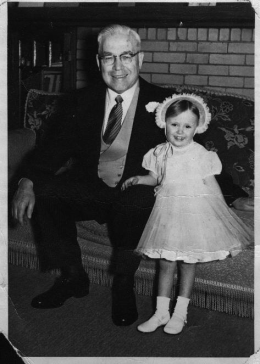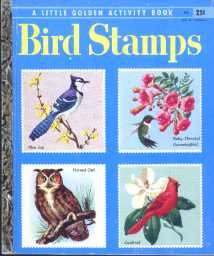|
Grandpa's Canaries
If I was lucky, one of Grandpa's canaries would sing a long, beautiful song, but usually they just talked back and forth between their cages. They didn't say people words; they simply took turns making a long note that started low and went up 'til it ended in a squeaky question mark. "Beeeeeeeeeeee?" "Beeeeeeeeeeee?" I couldn't make my voice sound anything like their song, but it wasn't hard to say "Beeeeeeeeeeee?" I practiced and practiced until one day Grandpa said I sounded exactly like them. In my own backyard, a cardinal whistled from the treetops every day. Once when Grandpa was visiting, he heard the cardinal and told me that if I practiced, he bet I could whistle just like that. How would I know I was doing it right if he wasn't there? He told me to wait and see. So I practiced and practiced. And one morning when I was whistling in my bedroom, a cardinal flew to the maple tree outside the window, peeked right in, and sang back to me. He thought I was another cardinal! I couldn't wait to tell Grandpa. His eyes would sparkle and shine to hear about it. I loved my backyard robins and cardinals, and sparrows that cheeped cheerful bedtime stories from the bushes by our house. Grandpa said there were more kinds of birds than you could shake a stick at. We both laughed at that, because who would shake a stick at a bird? He told me that there used to be more kinds of birds than there were nowadays. When he was a little boy, his own grandpa, my great, great grandpa, told him stories about a beautiful blue and rosy-colored bird, the passenger pigeon, that lived before Grandpa was born. There were so many that when flocks passed over a town, they filled the sky for hours. We couldn't imagine so many! They flew so fast that they were nicknamed blue meteors. But people killed them all, except the very last one. Her name was Martha, and she lived in a zoo in Cincinnati until she died of old age, or maybe of loneliness. Grandpa read a newspaper article about Martha when he was a teenager. After she died, passenger pigeons were extinct. That was too sad to talk about. Grandpa put his cheek next to mine and we just hugged. He told me about another kind of pigeon, the homing pigeon, that served in the army during World War I when Grandpa was a soldier. He said some soldiers took homers along wherever they went. If a troop was in danger, they wrote a note and put it in a special tube hooked to a pigeon's leg and set it free. The pigeon carried the message to headquarters so other troops would rescue them or bring medicine or supplies.One pigeon, named Cher Ami, kept flying even after her leg was shot almost completely off. She saved the day! Army doctors made her well, and she got a medal. Grandpa said these homing pigeons were the exact same kind of pigeons that we saw every day flying around the city. Whenever I watched them beat their big, powerful wings, so proud and carefree, I wondered if they knew that some of their great, great grandpas and grandmas were heroes. Grandpa told me that even pet canaries saved lives. People working deep inside mines sometimes breathed poisonous gases, and the most dangerous gases didn't have a smell. People in a mine might suddenly drop dead without even knowing what happened if those terrible gases leaked in. So miners took pet canaries down with them. If a canary suddenly keeled over, the miners got out in a hurry. I wondered if miners felt sad when the little birds died. Grandpa said he bet they loved their canaries as much as he loved his. But they must have been so grateful to be alive thanks to those tiny heroes. And of course those canaries went straight to heaven. I thought about tragic passenger pigeons, brave homing pigeons, bright-eyed canaries, and all the other lovely birds in heaven, where even angels flew on bird wings. I wanted to learn everything in the world about birds, so I read an encyclopedia article about them. I searched through every branch of every tree on my street looking for the tiniest bird in the world, the bee hummingbird; the biggest bird in the world, the ostrich; the fastest bird in the world, the peregrine falcon; and what looked like the prettiest bird in the world, the resplendent quetzal. What beautiful, mysterious names they had!
One spring morning I looked out my bedroom window and saw a flock of tiny birds in the maple tree. There were at least twenty of them, all different, brilliant colors--gold and yellow and orange, black and white and green and blue. No two were alike. They were so pretty, hopping and flitting among the shiny new leaves, twinkling with color and activity. I called my mother and she and I watched them for a long time. She guessed that someone's canaries got loose, but I thought they looked too bright and mysterious for ordinary canaries. Maybe these were canaries who had died saving miners' lives, and were now visiting us from heaven, like tiny guardian angels. As I grew older, I always loved visiting Grandpa and his canaries. But when I was in college, he got very sick and died. Suddenly the whole world felt dark and sad. In college I learned more about birds than I'd ever guessed anyone could know. On field trips I saw burbling bobolinks and brilliant blue jays, glowing orioles and glittering hummingbirds--every single bird I'd read about in the stamp book Grandpa had given me and more, all in real life. I learned how to hoot so owls would answer in the night forest, and how to make funny sounds with my throat to call secretive bitterns and rails from thick cattails. I whistled different tunes until I could get orioles, white-throated sparrows, and chickadees to whistle back to me. I practiced meowing like a catbird, yodeling like a loon, and whispering a soft, hollow moan like a mourning dove. I saw birds I'd never heard of before, and even learned what those tiny, colorful birds in my maple tree had been--wood warblers passing through my neighborhood on their long journey between the tropics and the far northern forests. I learned how and when to search for them so I could see more flocks, all as colorful and lively as the mysterious, heavenly birds I once watched with my mother. I had so many stories I wanted to tell Grandpa, but he was gone. Sometimes the sadness made my chest feel hollow and empty, like my heart had withered and died. Then one winter day when I was walking in a snowy woods I heard a familiar "Beeeeeeeeeeee?" Instantly my mind was filled with joyful thoughts of Grandpa--his kind, twinkly eyes and all the fun we'd had with his canaries. But this wasn't a canary. It was a redpoll--a tiny wild finch with a glittering ruby forehead and rosy pink breast and sides, sitting at the very tip top of a snow-covered spruce. It said "Beeeeeeeeeeee?" again, just like Grandpa's canaries. I couldn't help but answer it. "Beeeeeeeeeeee?" It called again and flew in for a closer look. We talked back and forth while it kept flying closer, until I was looking into its tiny, sparkly black eyes and it was looking into my great big human eyes. A wave of peacefulness washed over me. At that moment I felt Grandpa beside me, his warm cheek against mine. He was smiling. How I miss him still! But birds help keep him alive in my mind and heart. Every time city pigeons fly overhead, I think of Grandpa as a brave young soldier. Whenever a redpoll or other wild finch says "Beeeeeeeeeeee?" I remember standing on a chair talking to his canaries. When cardinals sing, I remember how he encouraged me to practice until I could whistle just like them. I remember how sad he and I felt about Martha, the last passenger pigeon, and think how proud he'd be that I grew up to be an ornithologist, doing my best to help keep other birds from becoming endangered or extinct. And whenever I see warblers, those tiny, colorful angel birds, I think of Grandpa in heaven, far beyond the clouds and stars, in a place that glows and sparkles with the loveliness of all the birds that ever lived and flew and sang on this beautiful earth that God gave us to share.
|

 When I was a little girl, I loved to visit my grandpa and his two pet canaries. As soon as we walked into Grandpa's front door, I always climbed up on a dining room chair to look at the little birds eye to eye. If I startled them they fluttered around, bashing into the cage bars, so I always moved slowly and carefully. If I stood quietly on the chair, they stayed perched on their little swings and looked into my eyes. Their sparkly black eyes were tiny beads, but Grandpa said they could see even better than our great big human eyes.
When I was a little girl, I loved to visit my grandpa and his two pet canaries. As soon as we walked into Grandpa's front door, I always climbed up on a dining room chair to look at the little birds eye to eye. If I startled them they fluttered around, bashing into the cage bars, so I always moved slowly and carefully. If I stood quietly on the chair, they stayed perched on their little swings and looked into my eyes. Their sparkly black eyes were tiny beads, but Grandpa said they could see even better than our great big human eyes.  Grandpa said those kinds of birds didn't live in our city, and he gave me a book with colorful stamps and stories about eighteen kinds of birds that lived closer to home. I read it over and over.
Grandpa said those kinds of birds didn't live in our city, and he gave me a book with colorful stamps and stories about eighteen kinds of birds that lived closer to home. I read it over and over.